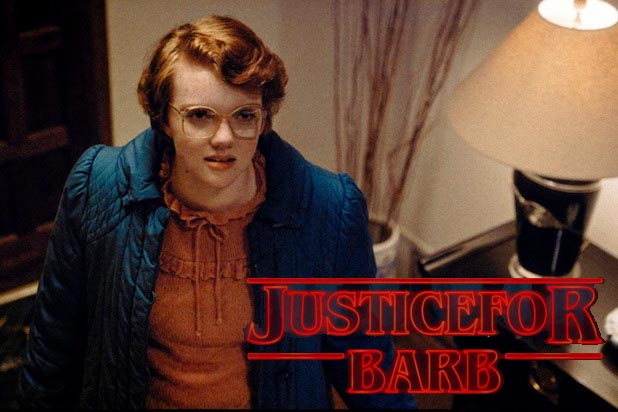Spoiler alert: Stranger Things is hands down one of the best Netflix series of 2016. Spoiler Alert: Barb was a dork and she bummed me out. Spoiler Alert: Barb doesn’t have the best time.
Even as we mourn the garbage fire that was 2016, I think the Duffer Brothers’ Netflix series Stranger Things had enough inventiveness and nuance for us to stare wistfully off in the distance and say: ‘Oh yeah, that happened.’
The series was immediately picked up by fans praising it’s measured ‘80s nostalgia, its injections of modern storytelling and character work that preventing the series from falling into clichés and genre trappings of that generation.
One of the more interesting things to come out of the show was the fan adoration for Barbara ‘Barb’ Holland (Shannon Purser). The fan outcry came immediately after the character’s fate was revealed, launching an online movement ‘#JusticeforBarb,’ where fans expressed their insights and outrage for who is decidedly a minor character with no real stake in the story.
Cassidy Frost, a first-year at New Brunswick Community College, expressed her love the character due to her being not someone we usually represented in the media.
“It’s refreshing to see a character that’s not all around perfect,” she said. “Nancy has her little quirks but she’s still too perfect for me to believe. Barb has her obvious flaws and it’s always nice to see a character that’s not totally polished.”
The fan outcry was eventually picked up by both the actress and the creators of the show. The Duffer Brothers directly referenced the hashtag and movement as plot information for the show’s second season came to light. This results in an entirely different sort of fan influence.
From riot threats if the creators of The Walking Dead were to kill Daryl to the fact that Supernatural keeps getting renewed for more seasons, it’s become a staple for fans to have influence over the fate of show. But that raises the question of who truly controls the story. We are the consumer and our reception is vital to a television series or film but should we have sway over a writer’s hand?
Mark Kilfoil, program director at the campus radio station CHSR, expressed his concern over showrunners over-accommodating their fans.
“I worry a bit about that because I think story writers should respect the story that they want to tell and doing everything for the fans and pleasing the fans doesn’t necessarily tell the deeper story,” he said.
“Sometimes a story needs to be jarring in order to tell an even more meaningful story and sometimes stories hurt.”
Kilfoil acknowledged the immunity showrunners give to some of their cast in an attempt to keep fans satisfied and watching the show.
“In some shows they refuse to kill off or harm characters simply because they’re so popular and that causes a bit of a narrative downward spiral.”
While acknowledging his love for Barb, Pursuer’s portrayal and an understanding of the fanbase, he believes creators should focus on the story.
“I hope they kind of stick to their narrative guns,” he said. “Fans need to take a step back and realize they wield an enormous amount of power and that power can make writers afraid of doing bold things because it offends their fans.”
Kathleen McConnell, professor of creative writing at St. Thomas University refers to times fan influence resulted in too safe a decision.
She used the film follow-up of the cult-hit television series Veronica Mars as an example. The film was funded by Kickstarter donations, with showrunners and actors only agreeing to do it if they had a fan backing.
“They did a poll to ask fans who they wanted Veronica Mars to get with at the end of the movie and what they wanted Veronica Mars’ future to be and I thought the choices were lousy in terms of narrative,” she said.
“Audiences are conservative so they chose for her to stay with her high school boyfriend and they also wanted her to stay in her hometown and stay as a detective in her hometown as opposed to her potential career as a lawyer in New York City.”
McConnell acknowledges the importance of fans’ satisfaction yet she agrees that a writer’s creed and craft ought to be respected.
“It’s a thing I teach in creative writing,” she said. “You create this sympathetic character that everybody is gonna love, that you love and then you put them through hell. Fans are always going to want you to be nice to your character but that doesn’t make the best storytelling. And I hate to tell you this but they aren’t real; nobody is actually going through hell.”
While Kilfoil and McConnell see fan influence as a detriment to showrunners, Frost presents the concept as more of a double-edged sword. She said fan outcry could possibly result in direct conversation between the storyteller and audience.
“It might be bad that writers get influenced by what fans want in such a way that they change their original idea,” she said. “But if I’m someone on Twitter and I’m talking about what I want to see on TV and a writer took note of that, that can be positive.”
Frost sees social media as a chance for fans to have an influence over persistent and outdated tropes. She believes that writers and showrunners can be swayed to end certain stereotypes and clichés presented in the media, such as unapologetically killing off lesbian characters.
“Like if even one show that was huge just took the hint and didn’t kill off a lesbian character – that would be them listening to the fans,” Frost said.
Whatever the case, we’ll see how the Duffer Brothers adapt to the public consensus and whether or not they do bring ‘justice for Barb’ when season two of Stranger Things drops later this year.

